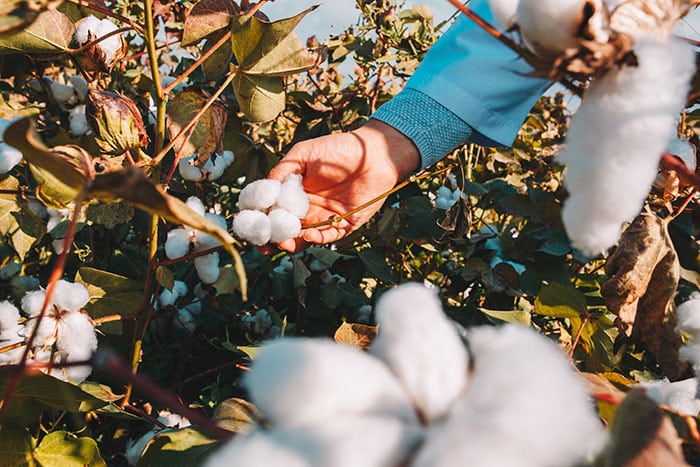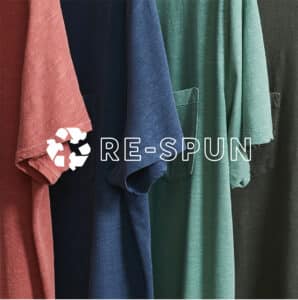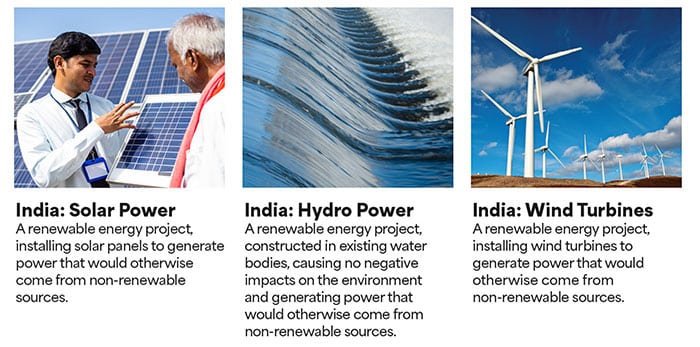
Last updated on May 29th, 2024 at 05:50 pm
Custom apparel is one of the most popular promotional products out there, and it is probably everyone’s favorite. From corporate apparel, to merchandise tees, to promotional shirt giveaways, custom printed shirts are in everyone’s closets. One of the most frequently asked questions we get from our climate-conscious customers is the effect of the clothing they’re buying on the world we share. In this blog post, we’ll discuss why you may consider sustainable corporate apparel, the recent improvements we are seeing in garment manufacturing process and lastly, the eco-friendly corporate apparel brands available.

According to the World Wild Fund, production and processing of cotton uses a large amount of water. Some experts contend that cotton is the largest user of water among all agricultural commodities. Conventional textile dyeing uses anywhere from 25 to 40 gallons of water per two pounds of fabric, and oftentimes the chemicals used in the process are discharged into the environment. Up to 20% of water pollution is the result of dyeing and treatment of textiles, according to the Ellen MacArthur Foundation’s New Textiles Economy report. Lastly, over 50% of the clothing is made in Asia, where manufacturing standards are very different from Europe and the US. They are then transported around the globe to the final retail markets. Overall, an enormous amount of energy and water is used throughout the manufacturing process, and this, along with wastewater management issues, creates a negative impact on the environment.
Natural dye
One antidote to this problem is a return to natural dyes. Allmade Apparel, an ethically and sustainable corporate apparel brand has begun to explore this alternative to regular dyes by using plants, seeds, bark and liche in their dyes. The company recently launched a line of mineral- dyed 100% organic cotton tees. Each tee in the Mineral Collection saves a whopping estimated 64 gallons of water compared to conventional production methods!
Sustainable fabric materials
 In the last few years, various corporate clothing brands have come up with new ways to incorporate sustainable materials such as recycled cotton, recycled polyester, renewable bamboo, modal (recycled beechwood), and Tencel® Lyocell, just to name a few. California clothing brand Marine Layer is using 41% sustainable fabric in their collection including recycled cotton. Since it is made from pre- and post-consumer fabric waste, no water is used in its production, nor does it need dyes or chemicals in order to be produced. The technology used to incorporate various sustainable materials has improved so much that the softness and construction does not suffer at all, in fact, some have argued that it has even improved. It is truly a win-win for both the consumers and the environment!
In the last few years, various corporate clothing brands have come up with new ways to incorporate sustainable materials such as recycled cotton, recycled polyester, renewable bamboo, modal (recycled beechwood), and Tencel® Lyocell, just to name a few. California clothing brand Marine Layer is using 41% sustainable fabric in their collection including recycled cotton. Since it is made from pre- and post-consumer fabric waste, no water is used in its production, nor does it need dyes or chemicals in order to be produced. The technology used to incorporate various sustainable materials has improved so much that the softness and construction does not suffer at all, in fact, some have argued that it has even improved. It is truly a win-win for both the consumers and the environment!
Carbon Neutral
Every organization has an effect on the world around them. For most companies, use of energy, transportation, and other resources are the main causes for their carbon footprints, and these main causes result in the release of greenhouse gases, namely carbon dioxide (CO2). In naturally-occurring amounts, CO2 is manageable through natural “sinks” that offset a buildup in the atmosphere. At excessive levels, however, it slowly but surely creates a world that cannot sustain life. While nobody can completely erase their carbon footprint, becoming carbon neutral is a process of making it as small as possible, and then finding ways to offset what remains, just like the natural world does for the CO2 it produces.
A lot goes into making a piece of garment — the fabric has to be spun, knit, and cut, then stitched together into garments. Then it must be transported from a factory to warehouse, sometimes over very long distances. The result isn’t limited to just a t-shirt or hoodie — each of these processes usually results in some level of carbon emissions too. Identifying them tells us where we should focus our attention to reduce the carbon footprint of apparel. “Up to 80 percent of a product’s environmental impact is determined in the design phase and is baked into materials and dyes,” according to the State of Fashion 2024 report.
Designing sustainable corporate apparel is one big step being taken towards helping manufacturers be carbon neutral, but as we factor in the human side of it — transportation, electricity and other resources — we’re not quite there yet. That’s where carbon offsets come into the picture.

A carbon offset is “an instrument designed to allow the continuing release of carbon in one place in exchange for reducing the carbon release in another place.”
For example, in our brand new collection of C-FREE selection of carbon neutral clothing and accessories, in the process of transporting the goods from one place to another, greenhouse gas was emitted. For this reason, we purchase carbon offset to support hydro power, wind turbines, acid abatement and more — and this is verified by a third party to balance the carbon equation from the places where we know we still emit carbon to places where we can help reduce it.
Durable Garments Instead of Fast Fashion

Every year in the United States, 66% of discarded textiles end up in landfills. This point is most important because whatever custom apparel you decide to use on your team, choosing quality over quantity will always be the best choice for the environment. A well constructed quality work jacket or polo help keep many low quality cheaply-made counterparts out of the landfill. Furthermore, even when they become damaged, companies like Patagonia and North Face have programs to repair them to prolong the lifespans or to re-purpose into something new. We can help create a more sustainable corporate apparel trend that focuses on purposeful, well intentioned team apparel, promoting a conscious consumption culture with less waste.
Marine Layer – using sustainable fabrics, has a re-spun program where it recycles old garments into new fabric.
Patagonia – as of 2024, 99% of its line is made with preferred materials which includes recycled materials. It is also making progress in fair wage, fair trade and traceable virgin fabrics.
North Face – commitment to environment includes circular design, using sustainable material, reducing greenhouse gas emission with suppliers and transportation, rethinking packaging.
Bella Canvas – eco-friendly manufacturing practices including garments are dyed and cut in Los Angeles, efficient dying and steaming fabric process.
C-Free Collection – includes styles from OGIO, AllMade, Port & Company, District and Sport-Tek. All products from C-Free are carbon neutral, the important steps include:
SHOP OUR 2024 SUSTAINABLE COLLECTION
Are you interested in sustainable apparel for your team or customers? Curious what brands will work with your style and budget? Let our team of expert help you get started! Contact us today!